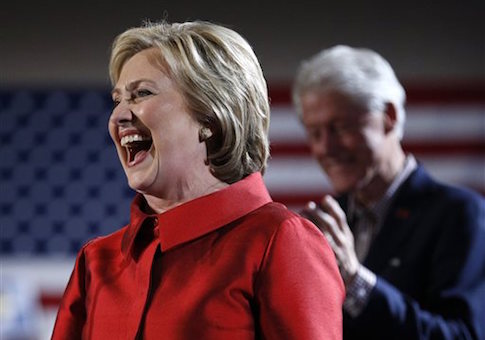The State Department is seeking to limit the questioning of Hillary Clinton’s former aides in an ongoing Freedom of Information Act lawsuit.
According to a court filing first reported by Politico, lawyers for the State Department on Tuesday took issue with the discovery plan proposed by Judicial Watch, a watchdog group that sued the agency for records related to Clinton’s tenure as secretary of state. The group’s plan would involve questioning former Clinton aides Cheryl Mills, Huma Abedin, and Bryan Pagliano in connection with Clinton’s private email system.
"Although Plaintiff’s proposed plan identifies certain individuals whom Plaintiff wishes to depose, it makes no proposal whatsoever regarding the scope of those depositions," the lawyers wrote. "State submits that the scope of discovery must be limited and specified at the outset to prevent questioning that exceeds the limited inquiry that the Court has authorized."
The State Department lawyers argued that questioning should be limited to the "reasons for the creation" of Clinton’s private email system. The layers wrote that Clinton’s former aides should not be questioned about the FBI investigation into Clinton’s email setup.
"Based on the Court’s statements at the February 23 hearing, State understands the scope of permissible discovery to be ‘the reasons for the creation of [the clintonemail.com] system,’" the lawyers wrote.
"State respectfully submits that the Court’s order should specify that discovery is limited to this topic. To that end, State requests that the Court clarify that Plaintiff is not entitled to discovery on matters unrelated to the topic identified by the Court, to include without limitation: the substantive information sought by Plaintiff in its FOIA request in this case, which involves the employment status of a single employee; the storage, handling, transmission, or protection of classified information, including cybersecurity issues; and questions about any pending investigations."
"State objects to any discovery requests pertaining to the FBI’s pending investigation into matters referred to it by the Inspectors General of the Intelligence Community and State in connection with former Secretary Clinton’s use of a private email server," the lawyers wrote.
The agency’s lawyers did not specifically object to any of the proposed depositions, though they indicated they may object if Judicial Watch moves to question Clinton herself.
Washington, D.C., District Court Judge Emmet Sullivan ordered discovery to continue in the case at the end of February. The State Department’s court filing came in response to Judicial Watch’s discovery plan submitted last month.
Judicial Watch initially brought the FOIA lawsuit against the State Department to obtain information about Abedin’s special employee status at the agency. The watchdog group argues that it may not have obtained all requested records because of Clinton’s private email setup, which was revealed in March 2015.
Separately, the FBI is investigating Clinton’s private email system, which has been found to hold thousands of messages containing classified information. The FBI is reportedly planning to interview Clinton’s former top aides, and possibly the former secretary of state herself, to complete the probe.
